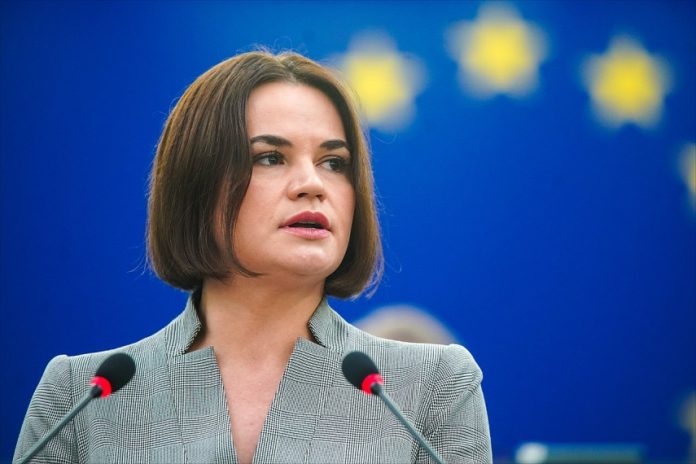“The regime will never break us but we need your assistance to fight it,” says Sviatlana Tsikhanouskaya during the EESC plenary session
At the February plenary session of the European Economic and Social Committee (EESC) Sviatlana Tsikhanouskaya, leader of the Belarusian democratic movement, called on the European institutions to support the Belarusian people in their fight against authoritarianism. Belarus must not be Putin’s consolation prize: it deserves to be part of the European family. This will only be possible with the active support of all EU institutions.
In her introductory statement, Ms Tsikhanouskaya referred to the worsening human rights situation in Belarus. Some 1 500 citizens have been detained for political reasons by the regime, an average of 17 people each day. Since 2021, more than 1700 NGOs, trade unions and civil initiatives have been shut down, with many of them subsequently working from exile. Hundreds of private companies have been forced to relocate to EU countries. On Monday 20 February, the Parliament voted for the death penalty against officials and soldiers who committed treason against the state.
EESC president Christa Schweng said that “All politicians with authoritarian tendencies are afraid of their people. They are afraid of civil society and its role of channelling new creative forces so that they can emerge and make things happen. The EU in general needs to continue supporting Belarusian civil society’s struggle for freedom and democracy, while also providing legal, financial and psychological support to those who had to flee against their will.”
Ms Tsikhanouskaya underlined the direct connection between the liberation of Belarus and Ukraine: “We are living through a historical moment. The future of Europe is being decided right now. It is being decided on the battlefields of Ukraine, in the Belarusian underground resistance, and of course in European capitals. The question is: are we as Europeans able to defend democratic values and freedoms, or will we let tyrannies take over again?”
Ms Tsikhanouskaya called on the European institutions to support the people fighting on the ground and in exile. She called for concerted action to condemn the repression of workers and for support for media and information campaigns “to counter Putin’s and Lukashenko’s propaganda”. She also proposed to establish a task force to monitor sanction enforcement so as to prevent Belarusian state-owned enterprises from continuing to export its products to the EU.
Ms Tsikhanouskaya also suggested that the Eastern Partnership, from which the Belarusian government withdrew in 2021, be revived in cooperation with the Belarusian opposition. “Belarusians feel that we are part of Europe and we see that two Eastern Partnership countries already have candidate status”, she said. As regards the European Economic and Social Committee, Ms Tsikhanouskaya proposed more systemic cooperation to strengthen the relationship between European and Belarusian civil society organisations.
In the debate which then took place, the EESC members expressed admiration for the courage and self-sacrifice demonstrated by the leader of the Belarusian democratic movement, acknowledging that she is the real elected president of the country.
They reaffirmed their full support for the trade unionists imprisoned for acting to make the world aware of the tragic events going on. “I think your speech here is another step in this direction and we call on the authorities to immediately and unconditionally release the people and trade unionists who have been arrested,” said Oliver Röpke, president of the EESC Workers Group.
“As the representatives of civil society, we stand ready and willing to speak on your behalf to all EU institutions in order to push forward your ideas and any initiatives you think could help the situation in Belarus,” stressed Stefano Mallia, president of the EESC Employers Group.
The vice-president of the Civil Society Organisations’ Group Simo Tiainen said: “You are a strong and courageous woman, Ms Tsikhanouskaya. You fearlessly work for a better future for your country. We are on your side. Instead of dictatorship, democracy belongs to Belarus.”
The members of the EESC also called on the European decision makers to provide financial and material support to the democratic movement in Belarus.
The debate marking the EESC’s solidarity with Belarus concluded with a standing ovation, with the red and white flag displayed in the meeting room.

